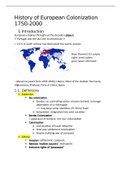History of European Colonization
1750-2000
1.Introduction
European empires throughout the decades (slides!)
!! Portugal was the last one to decolonize !!
= 1.6 % of earth surface has dominated the world, except…
Blue: (former) EU colony
Light: semi-colony
grey: never colonized
…Abyssinia (apart from 1936-1944), Liberia, Most of the Arabian Peninsula,
Afghanistan, Thailand, Parts of China, Japan
1.1. Definitions
1. Expansion
No colonization
o Exodus: no controlling center remains behind; no longer
dependent on a metropole
<-> may keep some identities cfr. China Town
o Emigration: integration into exist societies
Border Colonization
= expansion of borders; not ‘our’ colonization
Colonization
o Construction of naval networks
o Overseas settlement colonization
o Empire-building war of conquest
1. Colony
Invasion: settlement, conquest…
Remote ‘mother country’: metropolis
Exclusive rights of ‘possession’
,A colony is a new political organization created by invasion (conquest and/or
settlement colonization) but built on pre-colonial conditions. Its alien rulers are
in sustained dependence on a geographically remote ‘mother country’ or
imperial center, which claims exclusive rights of ‘possession’ of the colony
- Jürgen Osterhammel
a) Administration and legal statuses
~ viceroyalties, adiencias, protectorates, Crown colonies, free states,
overseas provinces, League of Nation mandates, UN trusteeship
territories
b) Economy and population
~ pure settlement colonies, mixed colonies, plantation colonies, colonies
of occupation, exploitation colonies, trading settlements, maritime
enclaves
1. Colonialism: the system of colonies
Colonialism is a relationship of domination between indigenous (or forcibly
imported) majority and a minority of foreign invaders. The fundamental
decisions affecting the lives of the colonized people are made and
implemented by the colonial rulers in pursuit of interests that are often
defined in a distant metropolis. Rejecting cultural compromises with the
colonized population, the colonizers are convinced of their own superiority and
of their ordained mandate to rule” – Jürgen Osterhammel
2. Colonization: the action of making colonies
Goes hand in hand with colony/colonialism, but
o Colonies without colonization military conquests
o Colonization without colonies border colonization
Other forms
o Internal colonization Brazil and hinterland
~ border colonization
o Subcolonial relations between two colonies of the empire
1. Colonial Empires
Formal empires
= several ‘peripheries’ are subordinated to the center
Portugal, Spain, Dutch Republic, France, Britain
Non-empires
= colonial powers without empires
Belgium (Congo + short) , Spain post 1820
Informal empires
, = pursue interests beyond acquisition of territory, IMPACT on
regions
19th century Britain in LA, China etc.
1. Imperialism : compromises all forces and activities contributing to the
construction and maintenance of empires
World wide protection of interests: colonialism = more regionally
More comprehensive: Colonialism < imperialism
Border/ feodality No metropole Ancient forms Voyages
assimilation
Mongol empire Austrian Vikings Gr colonies: One cult sphere
Habsburg (+ assimilated: Kiev) contact by trade Ibn Battuta (Isl)
Empire
Russian Crusader States Phoenician No permanent
‘colonization’ colonies transformation
Ma Huan
Roman empire German eastw To known
(despite of being oversea) Expansion places
(lost contact) Marco Polo
Byzantin/Abassid
empire/Ottoman
Ireland
The use of colonies in the balancing of power between European
nations
1. Periodization: 1750-2000?
David Landes: for the last thousand years, Europe has been the prime
mover of development and modernity
< The Wealth and Poverty of Nations
I. Wallerstein: 16th century rise of one single capitalist world economy
< The Modern World System
o North-western Europe: core
o Rest of Europe: semi-periphery
o Rest of the world: periphery
Pomeranz: many parallels / divergence
< The Great Divergence
o Core areas in the 18th c. Old World
NW Europe & Chinese and Japanese cores
o Many parallels
, Life expectancy, consumption, markets…
Asian GNP vs European GNP
1750: 130% - 1800: 100% - 1870: 50%
o Divergence in early 19th century
European shortage of energy
Timber coal steam IR
East Asian hinterlands boomed
Prevented need for innovation
J. Darwin: before 1800 what really stood out was not the sharp
economic contrast between Europe and Asia, but on the contrary, a
Eurasian world of ‘surprising resemblances’
< The Rise & Fall of Global Empires
David Abernethy: The Dynamics of Global Dominance
= combination of different views: both 16th/19th century important
o Expansion 1415-1773
1415: first overseas conquest of Portugal
1773: taxation policy of Britain in British N-Am
o First decolonization 1775-1824
o Consolidation 1914-1939
o Second decolonization 1940-1980
<-> maps of India: Britain established British India during ‘decades of
decolonization’
Antony G. Hopkins: Globalization in World History
o Archaic globalized networks
o Proto-globalisation (1600-1800)
o High imperialism
o Postcolonial era
<-> too general/vague can we be more concrete?
Conclusion
Early starters: Landes and Wallerstein
Critics: Pomerans and Darwin
Compromises: Abernethy and Hopkins
1.1. Causes of European dominance
1.1.1. Geography
Water and naval skills: peninsula surrounded by water




